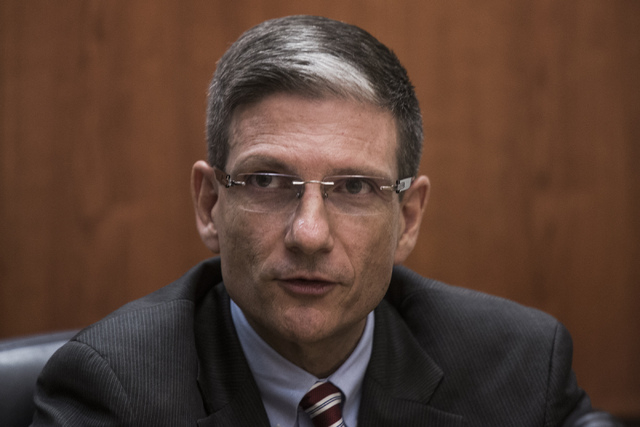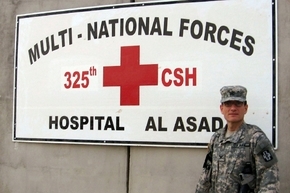Heck served in Iraq, now ‘appalled’ at collapse
WASHINGTON — Rep. Joe Heck of Nevada is one of 17 members of Congress who served in Iraq. He was a doctor and Army Reserve colonel called to active duty in 2008 to run an emergency room in a combat hospital at Al Asad Airbase west of Baghdad.
But Heck and other Iraq veterans on Capitol Hill now watch helplessly as Islamic militants push through the country that Americans fought to stabilize following the U.S. invasion in 2003.
“I am appalled. I am disappointed,” Heck said in an interview. “The very areas where we had troops stationed, where I was, are now the areas that are now under siege and falling.
“We took combat casualties,” Heck said. “I had lost a life (under his command) while I was there. These young soldiers and Marines who lost their lives in trying to bring some kind of stable government to Iraq.”
Three years after withdrawing U.S. troops from Iraq, President Barack Obama is facing decisions whether to re-engage in some way to rescue the government run by Prime Minister Nouri al-Maliki.
The Obama administration and al-Maliki were unable to negotiate an agreement that would have left a small number of U.S. troops to advise and continue training Iraqi forces after combat units returned home.
“We ultimately withdrew from Iraq and I think that is one of the things that is directly impacting the current situation there,” said Heck, a Republican who generally has been critical of Obama’s handling of the military.
“The fact we did not leave a small advise-assist-and-train counterterrorist force there allowed a window of opportunity for Islamic jihadists to take hold and execute the types of missions they are now executing,” Heck said.
White House officials said this week it was unclear if a continued U.S. presence would have made a difference as forces aligned with the Islamic State of Iraq and Syria, an al Qaida-inspired group, sweep through the north and west of Iraq and close in on Baghdad.
The United States has sold about $15 billion in arms to Iraq, including 300 Hellfire missiles and thousands of rifles and grenades,. Some of that already has fallen into the hands of insurgents as Iraq soldiers have fled the fight in many areas.
Heck, who sits on the House Armed Services and Intelligence committees, said what is happening is “a melding of Sunni jihadists between Syria and Iraq. This may wind up leading to a true amorphous Islamic state made up of part of Iraq and part of Syria.”
Al-Maliki has asked the Obama administration to launch airstrikes against the advancing militants.
Obama said Friday he would make a decision what to do about Iraq “in the days ahead” but ruled out sending ground troops back to Iraq.
Heck said it might be too late as jihadists already have infiltrated Mosul, Fallujah and Tikrit, which was the hometown of Saddam Hussein.
“At this point once again we have lost a window of opportunity by delaying and hesitating,” Heck said. “When you see movements of organized convoys that are targets, that’s one thing. But when you have individual militants that are now within the cities, surrounded by a civilian population, that makes things much more difficult.
“In those situations you need boots on the ground, and we are not going to put boots back on the ground in Iraq,” said Heck, who does not favor returning U.S combat troops to Iraq.
U.S. Sen. Dean Heller, R-Nev., said Friday he was disturbed by developments in Iraq, calling it “a tough situation” for the country and for the United States to determine what to do. He said he didn’t blame any particular administration — Obama’s or President George W. Bush’s — but said the situation shouldn’t have been allowed to get out of control.
“Mistakes, I think, have been made along the way,” Heller said in Las Vegas after meeting at the College of Southern Nevada with advocates on the issue of sexual assaults on university campuses. “I would not hold either particular party” to blame, however, he added.
Asked what the U.S. should do, Heller said, “I”m going to leave the decision to the administration” and American military leaders “and hope they make the right decision.”
“If you’re asking me whether we want boots on the ground, absolutely not,” Heller said, however.
Asked if he would be opposed to U.S. airstrikes, Heller said, “I would not be opposed. … I think we’re finding ourselves in a situation that is dangerous.”
Rep. Tulsi Gabbard, D-Hawaii, another Iraq vet, said Friday she does not support U.S. airstrikes in Iraq. “What real difference would it make on the ground?” she said on MSNBC. “This is a religious civil war.”
Unlike Iraq, the Obama administration has a deal with Afghanistan that will leave a residual force of 9,800 troops in the country once U.S. combat soldiers withdraw at the end of the year. That number would be halved by the end of 2015 and reduced again to a small unit by the end of 2016.
Heck said he could not predict whether the leftover U.S. troops would prevent Afghanistan from falling into the same situation as Iraq.
“It’s hard to Monday morning quarterback before the ball is hiked,” he said.
Without some continued U.S. presence, “I think we would certainly see in Afghanistan without a doubt what we are seeing in Iraq,” Heck said. “Whether or not that is going to be enough to prevent it from happening, you can go to the sports book and take odds on it.”
Review-Journal writer Laura Myers contributed to this report. Contact Stephens Washington Bureau Chief Steve Tetreault at STetreault@stephensmedia.com or 202-783-1760. Find him on Twitter: @STetreaultDC.



















